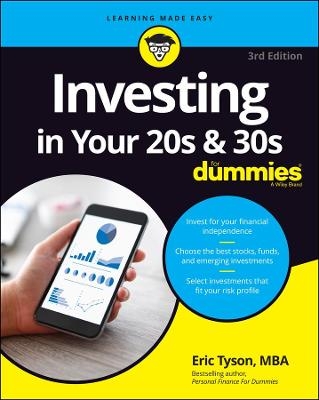
Investing in Your 20s & 30s For Dummies
For Dummies (Verlag)
978-1-119-80540-3 (ISBN)
You may be at the stage of your life where you’re still watching every penny, but you know the earlier you invest, the more time your money has to work for you. Investing in Your 20s and 30s For Dummies provides novice investors with time-tested advice, along with strategies that reflect today’s market conditions. You’ll get no-nonsense guidance on how to invest in stocks, bonds, funds, and even real estate—complete with definitions of all the must-know lingo. You’ll also learn about the latest investment trends, including using robo-advisors to manage your portfolio, relying on apps to make fast trades, and putting your hard-earned cash in digital currencies. Armed with the knowledge and strategies in this book, you can invest wisely, monitor your progress, and avoid risking too much. Today’s investing landscape is changing at record speed, and this book helps you keep up. Find information on the latest tax laws, financial lessons learned from the COVID-19 pandemic, and popular funds for the 2020s.
Learn the investment basics you need to get started
Discover new tools and technologies that make it easier than ever to participate in the market
Build a diverse portfolio that reflects your values, financial goals, and risk tolerance
Feel more confident as you fund an investment account, choose equities or funds, and plan for the future
Make an impact with your money by selecting socially responsible investments
Figure out how much money to invest in employer-sponsored accounts or other retirement plans
If you’re a little unsure about stepping into the world of investing, Investing in Your 20s and 30s For Dummies gives you the confidence you need to establish a smart investment strategy. Grab your copy today.
Eric Tyson, MBA, is a bestselling personal finance author, counselor, and writer. He is the author of the national bestselling financial books Investing For Dummies, Personal Finance For Dummies, and Home Buying Kit For Dummies.
Introduction 1
About This Book 1
Foolish Assumptions 2
Icons Used in This Book 3
Beyond the Book 3
Where to Go from Here 3
Part 1: Getting Started with Investing 5
Chapter 1: Making Sense of Your Investing Options 7
Growing Your Money in Ownership Investments 7
Sharing in corporate growth and profits: Stocks 8
Profiting from real estate 9
Succeeding in small business 10
Making “riskier” choices: Options, cryptocurrencies, and so on 10
Keeping Money in Lending Investments 10
Understanding Risks and Returns 11
Realizing risks 11
Managing risks 13
Making sense of returns 14
Where to Invest and Get Advice 15
Finding the best fund companies and brokers 15
Finding an acceptable advisor 16
Chapter 2: Using Investments to Accomplish Your Goals 19
Setting and Prioritizing Your Shorter-Term Goals 19
Accumulating a rainy-day fund 20
Saving for large purchases 21
Investing for a small business or home 21
Saving for kids’ higher educational costs 22
Investing short-term money 23
Investing in Retirement Accounts 23
Understanding retirement account perks 23
Grappling with retirement account concerns 24
Taking advantage of retirement accounts 25
Surveying retirement account choices 26
Selecting retirement account investments 29
Assessing Your Risk-Taking Desires 29
Chapter 3: Setting Your Return Expectations 31
Estimating Your Investments’ Returns 32
Money market funds and savings account returns 32
Bond returns 33
Stock returns 34
Real estate returns 35
Small-business returns 36
Compounding Your Returns 36
The value of getting a few extra percent 37
Considering your goals 38
Chapter 4: Minimizing Your Taxes When Investing 39
Understanding Investment Taxes 40
Tracking taxation of investment distributions 40
Determining your tax bracket 41
Highlighting the Tax Cuts and Jobs Act bill .42
Devising tax-reduction strategies 44
Reducing Your Taxes When Selling Investments 45
Weighing nontax issues 45
Tuning in to tax considerations 46
Part 2: Preparing Your Investing Foundation 51
Chapter 5: Laying Out Your Financial Plans 53
First Priorities: Paying Off High-Cost Debt and
Building a Safety Reserve 54
Paying off high-cost consumer debt 54
Establishing an emergency reserve 55
What about Paying Down Other Debts? 56
Assessing student loans 56
Considering paying down mortgage debt 58
Sorting Out Your Financial Plans 58
Considering your investment options and desires 59
Assessing your savings rate 60
Investing regularly with dollar cost averaging 61
Knowing the Impact of Investing for College Costs 62
Paying for college 63
Considering educational savings account options 64
Investing money earmarked for college 65
Securing Proper Insurance 65
Chapter 6: Starting Out with Bank and Credit Union Accounts 67
Understanding FDIC Bank Insurance 68
Investing in Banking Account and Savings Vehicles 68
Bank checking accounts and debit cards 69
Savings accounts and certificates of deposit 70
Negotiating with Bankers 71
Feeling Secure with Your Bank 72
Evaluating any bank 72
Protecting yourself when banking online 73
Exploring Alternatives to Bank Accounts 75
Credit union accounts and benefits 75
Brokerage cash management accounts 76
Money market mutual funds 77
Chapter 7: Managing Money Market Funds 79
Defining Money Market Mutual Funds 79
Making sense of the appeal of money market funds 80
Understanding the drawback of money market funds 81
Looking at Money Market Fund Holdings 81
Protecting and Accessing Your Money in Money Funds 83
Protecting your money 83
Accessing your money 83
Using Money Market Funds in Your Investment Plan 84
Shopping for the Best Money Funds 86
Discovering traits of leading money funds 86
Naming good money funds 87
Alternatives to Money Market Mutual Funds 88
Part 3: Investing in Stocks, Bonds, and Funds 91
Chapter 8: Getting Your Slice of Capitalism with Stocks 93
What Are Stocks? 94
How (and Why) You Can Make Money with Stocks 95
Understanding the importance of corporate profits 95
Making sense of how you profit with stocks 96
Timing Your Stock Buying and Selling 97
Following market indexes 97
Using price/earnings ratios to value stocks 99
Avoiding temptations and hype 100
Getting past the gloom 101
Sidestepping common investing minefields 102
Highlighting How to Invest in Stocks 103
Investing in stock mutual funds and exchange-traded funds 103
Picking your own stocks 104
Maximizing Your Stock Market Returns 108
Chapter 9: Securing Investment Income and Principal with Bonds 109
Defining Bonds 110
Understanding bond issuers 110
Considering credit (default) risk 113
Making sense of bond maturities 113
Using Bonds in a Portfolio 114
Finding uses for bonds 115
Comparing other lending investments with bonds 116
How and Where to Invest in Bonds 119
Choosing between bond funds and individual bonds 120
Investing in Treasury bonds 120
Investing in non-Treasury individual bonds 121
Evaluating individual bonds you currently hold 122
Chapter 10: Fund Investing: Mutual Funds and Exchange-Traded Funds 123
Understanding the Advantages of Funds 124
Maximizing Your Chances for Fund Investing Success 126
Understanding the importance of performance and risk 126
Examining fund management experience 127
Keeping costs down 127
Understanding and using index funds 128
Understanding exchange-traded funds: Index funds that trade 129
Creating and Managing a Fund Portfolio 131
Identifying the Best Mutual Funds and ETFs 133
Investing in the best ETFs 133
Picking the best stock funds 134
Balancing your act: Funds that combine stocks and bonds 136
Finding the best bond funds 137
Considering Alternatives to Investing in Funds 142
Creating your own fund 142
Robo advisors 142
Unit investment trusts 143
Brokerage managed accounts 143
Hedge funds for the wealthier 144
Chapter 11: Understanding Investment Brokers 145
Getting Your Money’s Worth: Discount Brokers 145
Assessing the high-commission salespeople’s arguments 146
Selecting a discount broker 147
Checking Out Online Brokers 149
Considering “free” online trades 149
Examining your online trading motives 150
Taking other costs into account 151
Looking at service quality 151
Listing the best online brokers 152
Part 4: Investing in Real Estate, Small Business, and Other Investments 153
Chapter 12: Seeking Shelter and Appreciation in Real Estate 155
Comparing Owning a Home to Renting 156
Weighing financial considerations 156
Considering costs and your time frame 157
Deciding when to buy 158
Figuring Your Home-Buying Budget 160
Getting your financial house in order 160
Determining your down payment 160
Doing lenders’ calculations 161
Shopping for Your Home 163
Understanding your housing options 164
Researching communities 165
Checking out and valuing a home 166
Investing in Investment Real Estate 167
Understanding real estate investment’s appeal 168
Sizing up real estate investment options 169
Conducting real estate investing research 172
Chapter 13: Financing and Putting Together Real Estate Investment Deals 175
Financing Your Real Estate Deals 175
Achieving loan approval 176
Debating fixed-rate versus adjustable-rate mortgages 179
Deciding between fixed and adjustable mortgages 181
Finding your best fixed-rate mortgage 182
Landing an appropriate adjustable-rate mortgage 183
Understanding other mortgage fees 187
Finding the best lenders 187
Refinancing for a better deal 189
Working with Real Estate Agents 191
Recognizing agent conflicts of interest 191
Selecting a good agent 192
Putting Your Deal Together 194
Negotiating basics 194
Inspecting the property 195
Shopping for title insurance and escrow services 196
Selling Real Estate 197
Negotiating real estate agents’ contracts 197
Selling without an agent 199
Chapter 14: Taking Your Talents to the Small-Business Arena 201
Investing in Your Career 202
Deciding to Start Your Own Business 203
Weighing your options 203
Entrepreneuring at a company 204
Turning a Business Idea into Reality 204
Drawing up your business plan 204
Plotting to leave your job 207
Financing your business 208
Considering Small-Business Investment Options 210
Buying an existing business 210
Investing in someone else’s business 211
Looking at franchises 212
Beware the pitfalls of multilevel marketing companie 213
Chapter 15: Exploring Other Investment Vehicles 215
Calling on Options 215
Considering Gold and Other Precious Metals 216
Should You Invest in Currencies and Cryptocurrencies? 218
Contemplating Collectibles 220
Understanding the allure of collectibles 221
Seeing the realities of collectibles and their returns 221
Considering advice on buying collectibles 222
Understanding Annuities and Cash-Value Life Insurance 223
Availing yourself of annuities 223
Considering cash-value life insurance 224
Part 5: The Part of Tens 227
Chapter 16: Ten Things to Know about Investing Resources 229
Get Educated to Discern the Best from the Rest 229
Beware “Free” 230
Understand the Influence of Advertising 230
Value Quality over Quantity 231
Know How to Check Out a Resource 232
Beware Hype and Exaggeration 232
Don’t Assume Quoted Experts Know Their Stuff 233
Investigate Gurus’ Claims 233
Don’t Believe Investment-Newsletter Claims 234
Check Out and Keep Up with My Favorite Resources 234
Chapter 17: Ten Essential Tips for Investing Success 237
Regularly Save and Invest 5 Percent to 10 Percent of Your Income 237
Understand and Use Your Employee Benefits 238
Thoroughly Research Before You Invest 238
Shun Investments with High Commissions and Expenses 239
Invest the Majority of Your Long-Term Money in Ownership Investments 239
Avoid Making Emotionally Based Financial Decisions 239
Make Investing Decisions Based on Your Plans and Needs 240
Tap Information Sources with High Quality Standards 240
Trust Yourself First 241
Invest in Yourself and Others 241
Chapter 18: Ten Things to Know about Investing Apps 243
Beware of the General Dangers of Putting Apps on Your Cell Phone 244
Use Apps Only from Proven Companies with Good Reputations and Longevity 244
Consider the Alternatives to an App 245
Use thpaee Best Personal Finance Apps to Have More to Invest 245
Be Skeptical of Investing Apps Offering “Free” Trading 246
Review Current and Historic Financial and Economic Data 246
Invest with Leading Fund Providers 247
Tap into the Best Investment Brokerage Firms 247
Examine the Best Real Estate Apps 247
Seek out Good Small-Business Apps 247
Bonus Chapter: Taking Care With Health Insurance 249
Index 261
| Erscheinungsdatum | 29.07.2021 |
|---|---|
| Sprache | englisch |
| Maße | 185 x 231 mm |
| Gewicht | 408 g |
| Themenwelt | Wirtschaft ► Betriebswirtschaft / Management |
| ISBN-10 | 1-119-80540-6 / 1119805406 |
| ISBN-13 | 978-1-119-80540-3 / 9781119805403 |
| Zustand | Neuware |
| Informationen gemäß Produktsicherheitsverordnung (GPSR) | |
| Haben Sie eine Frage zum Produkt? |
aus dem Bereich


